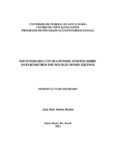| dc.creator | Rocha, Jean Paul Santos | |
| dc.date.accessioned | 2014-06-06 | |
| dc.date.available | 2014-06-06 | |
| dc.date.issued | 2013-05-16 | |
| dc.identifier.citation | ROCHA, Jean Paul Santos. IMUNOTERAPIA CONTRA PITIOSE: EFEITOS SOBRE OS PARÂMETROS IMUNOLÓGICOS DOS EQUINOS.. 2013. 48 f. Dissertação (Mestrado em Farmácia) - Universidade Federal de Santa Maria, Santa Maria, 2013. | por |
| dc.identifier.uri | http://repositorio.ufsm.br/handle/1/8987 | |
| dc.description.abstract | Pythiosis is a granulomatous, life-threatening disease of humans and animals, which is caused by the oomycete Pythium insidiosum. The treatment of the infections caused by this pathogen is complicated because of its cell wall and cytoplasmic membrane characteristics. Therefore, immunotherapy obtained from P. insidiosum culture extracts has emerged as an alternative treatment for equine pythiosis. Notwithstanding, the mechanisms by which immunotherapy work are not yet fully understood. The aims of this study were: a) to evaluate the immunological parameters in immunotherapy by measuring interleukin-2 (IL-2) and interferon-γ (IFN-γ) levels; b) to evaluate the biochemical parameters (hepatic function) in the horses of the experiment. To address this issue, 10 horses were divided in two groups: control (n=5), composed of animals without pythiosis; and infected (n=5), composed of animals with the disease. Animals from both groups received four doses of the immunotherapeutic product PitiumVac®. A significant increase in IL-2 and IFN- γ levels was observed after 42 days of immunotherapy in the infected group, and the animals were considered cured. The immunotherapy also improved the hepatic function of the animals, decreasing alanine aminotransferase and alkaline phosphatase levels. This may be a result of the interaction of different immunotherapeutic antigen present in the immune system, causing an increase in the production of these cytokines and establishing a predominance of TH1. | eng |
| dc.format | application/pdf | por |
| dc.language | por | por |
| dc.publisher | Universidade Federal de Santa Maria | por |
| dc.rights | Acesso Aberto | por |
| dc.subject | Pitiose | por |
| dc.subject | Pythium insidiosum | por |
| dc.subject | Imunoterapia | por |
| dc.subject | Pythiosis | eng |
| dc.subject | Pythium insidiosum | eng |
| dc.subject | Immunotherapy | eng |
| dc.title | Imunoterapia contra pitiose: efeitos sobre os parâmetros imunológicos dos equinos. | por |
| dc.type | Dissertação | por |
| dc.description.resumo | A pitiose é uma doença infecciosa, com risco de morte, que acomete animais e humanos, caracterizada por lesões granulomatosas, tendo como agente etiológico o oomiceto Pythium insidiosum. O tratamento de infecções causadas por P. insidiosum em animais e humanos é complicado pelas características do agente, sobretudo a composição de sua parede celular e membrana plasmática. A imunoterapia surgiu como uma alternativa para o tratamento da pitiose equina, com a produção de imunoterápico a partir de culturas do próprio agente. Apesar dos estudos sobre a doença e a imunoterapia, ainda não há um completo conhecimento dos mecanismos envolvidos. . Os objetivos deste trabalho foram: a) analisar os parâmetros imunológicos envolvidos na resposta frente à imunoterapia por meio da quantificação da interleucina 2 (IL2) e interferon gama (IFN-γ); b) analisar os parâmetros bioquímicos (função hepática) dos equinos envolvidos no experimento. Para tal foram utilizados 10 equinos, divididos em 2 grupos: controle n=5( animais hígidos sem a doença) e infectado n=5( com pitiose clínica). Todos os 10 animais dos 2 grupos receberam 4 doses do imunoterápico PitiumVac a cada 14 dias. Os parâmetros imunológico dos animais demostraram uma diferença estatística significativa no grupo infectado após o tratamento com o imunoterápico PitiumVac®. Após 42 dias de imunoterapia foi observado um aumentando de forma significativa os níveis séricos de IL-2 e IFN-γ no grupo dos animais infectados, culminando com a cura clínica destes animais. Após a imunoterapia foi constatada uma melhora na função hepática, com a diminuição da alanina aminotransferase (ALT) e fosfatase alcalina (FA). Este resultado pode ser decorrente da interação distinta do antígeno presente no imunoterápico com o sistema imunológico, provocando o aumento na produção destas citocinas e estabelecendo um predomínio de resposta TH1. | por |
| dc.contributor.advisor1 | Santurio, Janio Morais | |
| dc.contributor.advisor1Lattes | http://lattes.cnpq.br/6316012260769979 | por |
| dc.contributor.referee1 | Leal, Daniela Bitencourt Rosa | |
| dc.contributor.referee1Lattes | http://lattes.cnpq.br/3639683273462361 | por |
| dc.contributor.referee2 | Corte, Flavio Desessards de La | |
| dc.contributor.referee2Lattes | http://lattes.cnpq.br/4040388452531898 | por |
| dc.creator.Lattes | http://lattes.cnpq.br/4868485983423246 | por |
| dc.publisher.country | BR | por |
| dc.publisher.department | Farmacologia | por |
| dc.publisher.initials | UFSM | por |
| dc.publisher.program | Programa de Pós-Graduação em Farmacologia | por |
| dc.subject.cnpq | CNPQ::CIENCIAS BIOLOGICAS::FARMACOLOGIA | por |


